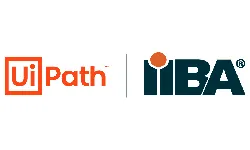
Automation Business Analysis - Concepts and Principles 
Learn the basics of Automation Business Analysis - Concepts and Principles ▼
ADVERTISEMENT
Course Feature
![]() Cost:
Cost:
Free
![]() Provider:
Provider:
Coursera
![]() Certificate:
Certificate:
Paid Certification
![]() Language:
Language:
English
![]() Start Date:
Start Date:
29th May, 2023
Course Overview
❗The content presented here is sourced directly from Coursera platform. For comprehensive course details, including enrollment information, simply click on the 'Go to class' link on our website.
Updated in [March 09th, 2023]
This course, Automation Business Analysis - Concepts and Principles, provides an overview of the fundamentals of Business Analysis and Robotic Process Automation (RPA). It covers topics such as understanding the enterprise problems or goals, designing solutions, devising strategies, and driving change. Participants will learn techniques for ensuring project success at every step, as well as how to incorporate business analysis deliverables and models into an RPA specific Process Definition Document (PDD). Aligned with IIBA's BABOK, this course will help participants take the first step in their Business Analyst journey and will aid them with preparation for ECBA (Entry Certificate in Business Analysis). Participants will need IIBA’s BABOK Guide, which can be accessed at no additional cost.
[Applications]
Upon completion of this course, participants will be able to apply the concepts and principles of Automation Business Analysis to their work. They will be able to identify business needs and determine solutions to enterprise business problems, as well as incorporate business analysis deliverables and models into an RPA specific Process Definition Document (PDD). Additionally, they will be able to assess the impact of automation implementation and devise strategies for ensuring project success.
[Career Paths]
1. Automation Business Analyst: Automation Business Analysts are responsible for analyzing business requirements, identifying possible automatable processes, and assessing the impact of automation implementation. They must be skilled in the science of automation to facilitate communication and collaboration with relevant stakeholders. Automation Business Analysts are in high demand as organizations move towards automation to generate productivity boosts at the process, workflow, and workforce levels.
2. Robotic Process Automation (RPA) Developer: RPA Developers are responsible for designing, developing, and deploying robotic process automation solutions. They must have a strong understanding of the business process and be able to identify areas of improvement. RPA Developers must also be able to develop and maintain automation scripts and be able to troubleshoot any issues that arise.
3. Business Process Improvement (BPI) Consultant: BPI Consultants are responsible for analyzing existing business processes and identifying areas of improvement. They must be able to develop and implement strategies to improve efficiency and reduce costs. BPI Consultants must also be able to develop and maintain process documentation and be able to communicate effectively with stakeholders.
4. Business Process Automation (BPA) Architect: BPA Architects are responsible for designing and developing automated business processes. They must have a strong understanding of the business process and be able to identify areas of improvement. BPA Architects must also be able to develop and maintain automation scripts and be able to troubleshoot any issues that arise.
[Education Paths]
Recommended Degree Paths:
1. Bachelor of Science in Business Analysis: This degree program provides students with the skills and knowledge needed to analyze and interpret data, identify trends, and develop strategies to improve business operations. Students learn how to use data to make informed decisions, develop business plans, and create effective solutions to business problems. This degree program also covers topics such as project management, financial analysis, and organizational behavior.
2. Master of Science in Business Analytics: This degree program focuses on the application of data-driven decision-making to solve complex business problems. Students learn how to use data to identify trends, develop strategies, and create solutions to improve business operations. This degree program also covers topics such as predictive analytics, data mining, and machine learning.
3. Master of Business Administration in Business Analytics: This degree program provides students with the skills and knowledge needed to analyze and interpret data, identify trends, and develop strategies to improve business operations. Students learn how to use data to make informed decisions, develop business plans, and create effective solutions to business problems. This degree program also covers topics such as project management, financial analysis, and organizational behavior.
Developing Trends:
1. Automation: Automation is becoming increasingly important in the business world, and the demand for professionals with expertise in automation is growing. Automation is being used to streamline processes, reduce costs, and improve efficiency.
2. Data Science: Data science is becoming increasingly important in the business world, and the demand for professionals with expertise in data science is growing. Data science is being used to analyze large datasets, identify trends, and develop strategies to improve business operations.
3. Artificial Intelligence: Artificial intelligence is becoming increasingly important in the business world, and the demand for professionals with expertise in AI is growing. AI is being used to automate processes, identify patterns, and develop strategies to improve business operations.
Pros & Cons

Intuitive, interesting, practically applicable, simple link between BA and RPA, detailed concepts and principles, well structured and presented.

None mentioned.
Course Provider

Provider Coursera's Stats at AZClass
Automation Business Analysis - Concepts and Principles is a course designed to help learners understand the fundamentals of automation and business analysis. It covers topics such as the importance of data-driven decision-making, the role of business analysts in automation, and techniques to ensure project success. Participants will understand fundamental business analysis skills and how to incorporate business analysis deliverables and models into RPA-specific process definition documents. The course is aligned with IIBA's BABOK and will prepare learners for the ECBA (Introductory Certificate in Business Analysis).
Discussion and Reviews
0.0 (Based on 0 reviews)
Explore Similar Online Courses

Introduction to Community Management

Learn Functional Programming with Elixir

Python for Informatics: Exploring Information

Social Network Analysis

Introduction to Systematic Review and Meta-Analysis

The Analytics Edge

DCO042 - Python For Informatics

Causal Diagrams: Draw Your Assumptions Before Your Conclusions

Whole genome sequencing of bacterial genomes - tools and applications

Business Analysis Fundamentals - ECBA CCBA CBAP endorsed

Fundamentals of Business Analysis

Identify & Define the Problem with Business Analysis
 Related Categories
Related Categories
 Popular Providers
Popular Providers
Quiz
 Submitted Sucessfully
Submitted Sucessfully
1. What is the purpose of the Automation Business Analysis course?
2. What is the representation of ‘as-is’ business processes that are chosen for automation?
3. What is the key to success in today’s competitive business market?
4. What is the main purpose of the Automation Business Analysis course?
5. What is the purpose of the Automation Business Analyst role?
Correct Answer: To analyze business requirements, identify possible automatable processes, and assess the impact of automation implementation.


Start your review of Automation Business Analysis - Concepts and Principles